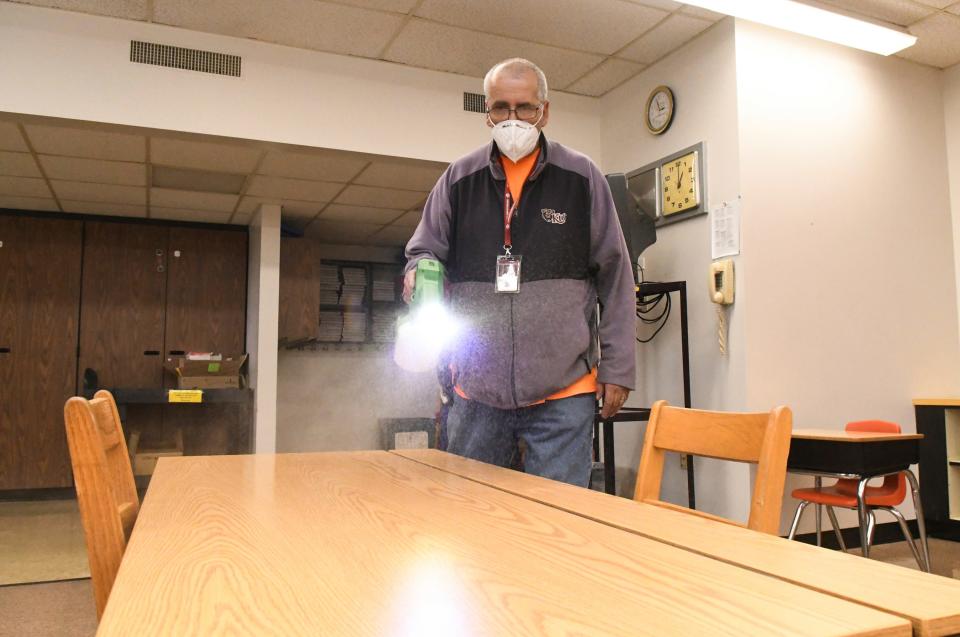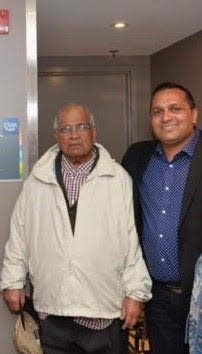COVID heroes: Custodians deserve our gratitude. I know because my dad worked as a cleaner.
Thirty years ago, my dad worked at a sugar plantation in Guyana. In fields once worked by African slaves and indentured Indian laborers, he had risen to become senior manager.
Our Guyanese family lived at a company compound built for British expatriates, with a swimming pool and a tennis court. With the country around us still hung over from colonial rule, we kids thought we had it all.
My dad knew better. He had started work at 14, so he had plenty of experience but not enough school, and he saw how important that missing piece was. He wanted us to be educated overseas.
USA TODAY's opinion newsletter: Get the best insights and analysis delivered to your inbox.
Two of my sisters had already emigrated, so the rest of our family followed them to Winnipeg, Manitoba, where we started a new life in the dead of winter. I’ll never forget the blast of cold that hit my face as we left the airport terminal.
That was a shock, but it was nothing compared with what hit me when I saw my dad mopping floors in his first job as an immigrant. It brought tears to my eyes.
Not because it was below him to be a cleaner. With no degree or local experience, he had to start somewhere – I understood that.
But the job was hard on him, which says something after a life in plantation work. Cleaning is physically taxing, it’s dirty and it puts you in close quarters with some nasty germs, microbes and pathogens.

During the COVID-19 pandemic, cleaners have been grossly underappreciated. You might think of doctors and nurses as front-line heroes, but some of the toughest battles have been fought by orderlies and custodians. They don’t make a lot of money, and they rarely get singled out for praise, but they save lives as surely as the others.
Cleaning became family business
I’ve been thinking a lot about them and other cleaners lately because our family is still in the business today. We employ a bunch of front-line heroes, and I think we owe them less risk and more peace of mind, even after we finally put COVID-19 behind us. We owe them and the people they clean for the best technology and tools available.
I say that having seen this work up close. As teenagers, my brothers and I would come home from school, relax for a few minutes then load up the car to go help my dad.
It wasn’t how most teens would choose to spend their evenings, and I eventually thought: Instead of working for someone else, why don’t we set up our own cleaning business?
A job came up with Transport Canada and we landed it. We ended up with 200 employees and a bunch of big contracts, including one at the same airport where our family had landed in the cold a few years earlier.

We eventually moved to Toronto to grow the business. For the past 10 years, we’ve expanded our cleaning business while building a technology start-up that makes ultraviolet disinfection robots and other advanced products.
COVID-19 has been horrible, but it has kept us very busy, especially in transit. In Toronto, monthly ridership fell to 12% of its previous rate in April 2020, as office workers started working from home and it became clear that passengers on trains, subways and other transit vehicles were at risk.
When the pandemic eventually recedes, restoring public confidence in mass transit will be critical. Some call it hygiene theater, but confidence matters.
Three-quarters of New Yorkers have told transit authorities that enhanced measures – such as continual cleaning, nightly shutdowns and deep disinfection – ought to continue to make them feel safe using the system, according to the New York Post.
Cleaning in hospitals reduces infections
Yet transit feels like child’s play compared with hospital safety. The pandemic has pushed emergency rooms, patient wards and health care workers to their limits, but surface disinfection was a critical-care issue for them long before COVID-19. It’s always going to be a priority.
That’s because the pathogens and superbugs lurking in our hospitals are stubbornly resistant to cleaners and modern medicines. Patients already have compromised immune systems, which makes them soft targets. Spread can happen whenever a patient or staff member touches a medical instrument, a catheter, even an innocuous item like a magazine or a drinking glass.
According to the Centers for Disease Control and Prevention, one in 31 hospital patients has a health care-associated infection on any given day.
That’s expensive. A 2014 study found that each year, 2 million Americans acquire infections in hospitals or while receiving care – and 90,000 of them die. The direct medical cost is as much as $45 billion, not to mention the personal and broader economic costs.
This is where robots come in. In an operating theater or a patient room, autonomous UV tech can kill pathogens at a level of efficacy human cleaners can’t approach.
Then the humans can spend their time on surfaces the robots can’t reach, surfaces they never would have had time to clean before. It’s a much better outcome for hospitals, patients and cleaners.
For me, this is about more than business – it’s personal. It’s about the front-line workers who have put themselves at risk over the past 18 months. It’s about my dad and all the other cleaners pushing a mop or wiping a rag, trying to do a difficult, dangerous job with basic tools.
If our cleaners have better technology at their disposal, it will mean better public confidence and better public safety. That’s going to matter as we put the pandemic behind us and for years to come.
Val Ramanand is CEO of TBM Service Group and co-founder of Solaris Disinfection.
You can read diverse opinions from our Board of Contributors and other writers on the Opinion front page, on Twitter @usatodayopinion and in our daily Opinion newsletter. To respond to a column, submit a comment to letters@usatoday.com.
This article originally appeared on USA TODAY: COVID cleaning: Custodians deserve extra gratitude for saving lives

 Yahoo Movies
Yahoo Movies 
